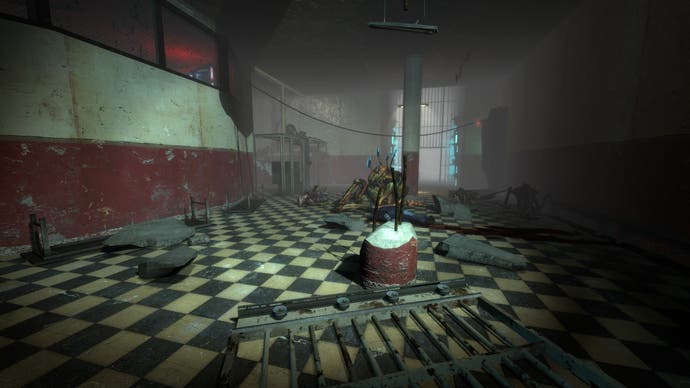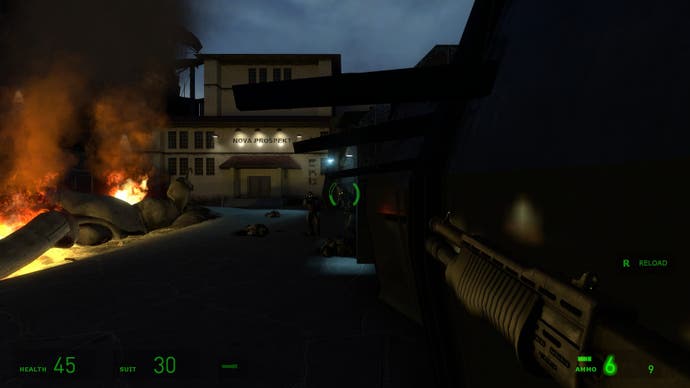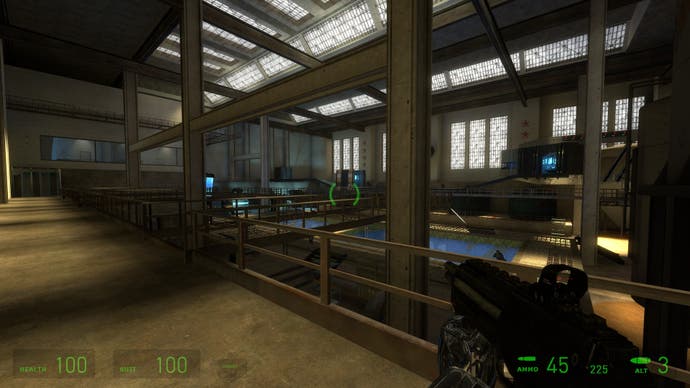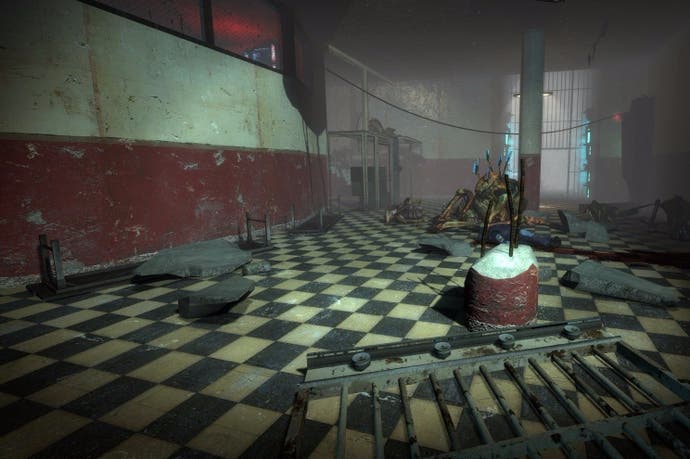Prospekt review
Shephard Commander.
It's been 11 years and four months since the release of Half-Life 2, and eight years and five months since Valve left Gordon Freeman's tale agonisingly unfinished in Episode 2. Not that I'm counting the days or anything. Just the months. And years. But it's fair to say that, by this point, fans of what is frequently regarded as the greatest FPS ever made are fairly keen to see its story finished. You can glimpse this in how every few weeks the vaguest outline of a lambda sign leads to ringing ululations of "HL3 CONFIRMED?!?!111" rebounding across the Internet.
For years Valve has been happy to let those voices scream into the void, to, in an amusing irony, let the pressure build. It's into this Freeman-parched climate that 25 year old Richard Seabrook has released Prospekt, an add-on for Half-Life 2 which possibly wouldn't have garnered much more attention than any other Half-Life 2 mod, were it not for the fact that it has been approved by Valve as a continuation of the storyline from Half Life: Opposing Force.
There are lots of exciting yet dangerous words in that above paragraph, words that will almost certainly lead to stratospheric hopes and impossible expectations. So let's temper those right now. Prospekt does not elaborate on the Half-Life 2 storyline in any significant fashion. It isn't Episode 3. Neither is it, truly, a sequel to Opposing Force, which was a huge and lavish expansion pack, basically a game in its own right, created by an incredibly talented team of developers.

Instead, Prospekt is best described as the equivalent of a Star Wars expanded universe novel; a pseudo-official alternative story that offers a few extra hours of Half-Life 2's Manhack-sharp combat. It's an impressive showcase from a first-time designer, demonstrating creativity and imagination within a restricted framework. But there are also inevitable limitations and a few rookie errors.
For Prospekt players reprise the role of Adrian Shephard, who was last seen stranded in inter-dimensional limbo by the G-Man after the events of Black Mesa. Now, finally, Shephard is released from his detention and delivered unto the bowels of Nova Prospekt, the Combine's foremost incarceration facility. His task; to aid Gordon Freeman as he struggles against the overwhelming Combine forces descending upon the prison.
Or at least, that's what I read on the game's Steam page after completing it. I assumed this was the motivation while playing, but aside from a couple of sentences at the very beginning, hastily added just before launch, this isn't really communicated verbally. Indeed, the vast majority of Prospekt's narrated story is delivered through aural flashbacks that describe the lead-up to Shephard's mission in Opposing Force. These are well written and acted, albeit flecked with sweary macho Marine discourse that seems weirdly out of place in the Half-Life universe. This isn't to say that it's bad. But it is noticeably divergent from Valve's scriptwriting style.
Nevertheless, Prospekt's narrative isn't particularly related to the events transpiring in the moment, and I would have liked more clarification about what exactly Shephard was trying to achieve and why. There are occasional glimpses offered by the environment and the Combine's radio-chatter, which Prospekt does a convincing imitation of. But even by Half Life's standards these cues are sparse to say the least.

Nova Prospekt is also a curious choice of setting for a Half-Life spin-off, because out of all the areas we experience throughout Valve's dystopian sci-fi, Nova Prospekt is the least interesting, a dingy sequence of concrete prison corridors blended with the Combine's bizarre love for blue metal-plate. Centring an entire game around this grim place poses a pretty stern design challenge, and for the first half-hour or so I was concerned for Prospekt's prospects. Those initial levels mostly comprise of long, empty corridors in which you do little more than retrace Freeman's trail of destruction, and it's quite some time before you get your hands on a weapon of any kind.
Seabrook's use of overlong corridors never fully dissipates, but Prospekt soon begins to mix things up, and although it doesn't have anything like the environmental diversity of the Half-Life games, it does get pretty creative with its more limited palette. There are some truly massive rooms in which you exchange sporadic fire with Overwatch soldiers, a neat little puzzle section reminiscent of James Bond's traversal through a booby-trapped ventilation system in Dr No, a brief foray back to Xen, and a splendid late-game twist that plays on the confines of everything you've seen up to that point.
Prospekt doesn't add anything new in terms of weaponry or enemies. Indeed, Shephard's arsenal is actually reduced compared to Freeman's, omitting the crossbow and the Gravity Gun. What it does instead is remix those familiar tools and opponents into a much more formidable challenge. Prospekt isn't a long game, but it's a tough one at times, throwing large groups of enemies down corridors where there is little cover, and forcing you to fend off waves of Combine soldiers in carefully designed, arena-like rooms. Staying alive requires liberal use of the sprint-key, perfectly times reloads, and an aim like Legolas. Put it this way: toward the game's end, your standard weapon of choice becomes the Overwatch rifle's secondary fire, that deadly ball of energy that bounces around rooms vapourising anything it touches, which you may have used about twice in the whole of Half-Life 2.

It is breathlessly paced, even compared to the fantastic 'Anticitizen One' and 'Follow Freeman' chapters of Half Life 2, and the level of difficulty is mostly well judged for veterans of the series. Sadly, it falls flat on its face at the end, with a finale that is horribly designed. It isn't simply that it's hard - although it is nightmarishly difficult - it's also downright unpleasant to experience. Without being too specific, it combines endless waves of enemies with blinding flashing lights and an environment that judders as if caught in a devastating earthquake. Playing it made me feel physically unwell, and I feel like I should apologise to my own brain for putting it through such trauma.
Elsewhere, Prospekt's most significant problem is it doesn't vary the combat as much as it needs to. Approximately 90 per cent of your encounters are with Combine soldiers, while all the other enemies of the Half-Life universe get brief cameos at best. Despite its fairly brief length, the relentless hordes of Combine eventually become repetitive, culminating that abysmal chunder-chamber for the finale. Part of Half Life's beauty is how it constantly mixes up the combat. Prospekt finds a beat and sticks to it, with only slight variations in rhythm.
Having said that, it's a beat that for the most part I found myself happily nodding along to, and you know what? Prospekt did scratch my Half-Life itch a little. Not a huge amount - it's too fleeting and lacks some of the subtleties in Valve's design. For just over a fiver, though, it's a worthy scrap of canon.

